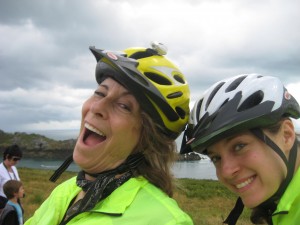Reversals

Recently I was emailing with my friend Greta at 12:56 a.m. This was early for both of us night owls, but I knew she’d had a busy week, so I wrote, “Now go to sleep!”
Greta replied, “I have to. My son set my computer to turn off at 1 a.m.”
That Greta’s son had set parental controls on his mother’s computer gave me more than just a chuckle; it gave me a jolt, reminding me of the parent-child reversals I had been noticing more and more in my own life.
My first blatant reversal took place more than a decade ago, when I was 53 and newly divorced. That year my 16-year-old daughter, Eliza, and I trained together for the Marine Corps Marathon. Well, not exactly together: her pace group ran near the front of the pack, while I in my neon CoolMax costume jogged among the less hurried.

On marathon day as I approached the finish line, there was Eliza, wrapped like a potato in a foil sheet, jumping and shouting, “Yay, Mama, you did it!” Nine years earlier in Paris’s Luxembourg Gardens, I had stood by the carousel in Paris’s Luxembourg Gardens cheering her—“Yay, Lizie, you got it!”—each time she reached out with her stick and captured a brass ring.
Years passed and my three daughters grew into attractive young women; it was hard to miss that the only time men on the street looked my way occurred when I was in the company of one of my girls. Maybe if I had dressed up more I would have attracted the occasional sideways glance. My kids continue to harp about my wardrobe, “No, Mom, your faded black jeans do not ‘read’ like black slacks.”

One night I took my youngest daughter, Emily, and her boyfriend, Ed, to a restaurant for dessert. The two of them volunteered that they would not have ordered $10 pastries if I were not paying. Emily asked, “When do we start paying for ourselves?”
“When you have more money than I do,” I replied.
Then I thought about my dad, who—toward the end of his life—had way less money than I did. Yet he insisted on paying whenever we went out to dinner. So we always ate at Boston Market: quarter chicken, two sides, Dad’s treat.
At one such dinner, I snuck ahead of him to the register and paid. My father complained, “A parent is supposed to take care of his children.” By this time I was in my sixties.
A couple of months later, he wept when I insisted on helping him out financially, so he and my mom would not have to move from the independent living community they so enjoyed. I understood that he felt forced to choose between two lousy alternatives (not that I gave him a choice).
And now my children nurture me. Whenever we are together, my middle daughter, Sabrina, is the one wearing an apron and wielding a spatula; I am her helper.
Last Thanksgiving eve, one of these passages hit hard. Emily and Ed took turns driving from Washington, D.C. to Ed’s family home in Syracuse, while I sat in the back seat squished beside containers of cranberry relish and the pot of adobo chicken I had prepared for our roadside dinner.
My sensation as the aging single mother, looked after by her daughter and her daughter’s boyfriend, surprised me. I became overly aware of myself. Was I talking enough? Probably I was talking too much. Talking helped me feel like more than just an observer; I didn’t want to retreat the way my mom sometimes had in later years at family dinners, chewing quietly amid her chatty offspring.
Reversals are not without benefits. Whereas I used to be the source of contacts for my children, say, for summer jobs, I now look to their high-powered friends to help create buzz for my new memoir.
On my last trip to New York, I observed in a pair of strangers the inevitable reversal. A mother, who was around my age, and her grown daughter hugged and said good-bye. The mother got into her car and turned on the ignition. Just then the daughter ran back and said, “And, Ma, text me when you get home so I know you got back safe and sound.”
It wasn’t that long ago that I ordered a battery operated alarm for Emily and Ed so they would be safe and sound in the event of a break in. I have a burglar alarm, but is it only a matter of time until my children, wanting me to be safe and sound—unlike the woman in the “Help! I’ve fallen and I can’t get up!” TV ad—demand that I get a Life Alert?
What reversals have you experienced with your parents and/or offspring?
LOTS ABOUT MARRIAGE AND RELATIONSHIPS IN MY NEW MEMOIR . . .
Confessions of a Worrywart: Husbands, Lovers, Mothers, and Others is now on Amazon.com, Kindle, and Smashwords
“A first-rate personal essayist, Susan Orlins delivers the goods time and again. Underneath her self-mocking voice, her abundant humor, her brio, there is the serious candor of a moralist who worries the problems that won’t go away.”
–PHILLIP LOPATE, author and editor of The Art of the Personal Essay
“Susan Orlins is America’s funniest neurotic since Woody Allen. Just be careful you don’t crack a rib reading Confessions of a Worrywart.”
–PATRICIA VOLK, author of Stuffed
Leave a Reply